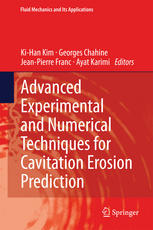

Most ebook files are in PDF format, so you can easily read them using various software such as Foxit Reader or directly on the Google Chrome browser.
Some ebook files are released by publishers in other formats such as .awz, .mobi, .epub, .fb2, etc. You may need to install specific software to read these formats on mobile/PC, such as Calibre.
Please read the tutorial at this link: https://ebookbell.com/faq
We offer FREE conversion to the popular formats you request; however, this may take some time. Therefore, right after payment, please email us, and we will try to provide the service as quickly as possible.
For some exceptional file formats or broken links (if any), please refrain from opening any disputes. Instead, email us first, and we will try to assist within a maximum of 6 hours.
EbookBell Team

5.0
108 reviewsThis book provides a comprehensive treatment of the cavitation erosion phenomenon and state-of-the-art research in the field. It is divided into two parts. Part 1 consists of seven chapters, offering a wide range of computational and experimental approaches to cavitation erosion. It includes a general introduction to cavitation and cavitation erosion a detailed description of facilities and measurement techniques commonly used in cavitation erosion studies, an extensive presentation of various stages of cavitation damage (including incubation and mass loss) and insights into the contribution of computational methods to the analysis of both fluid and material behavior. The proposed approach is based on a detailed description of impact loads generated by collapsing cavitation bubbles and a physical analysis of the material response to these loads. Part 2 is devoted to a selection of nine papers presented at the International Workshop on Advanced Experimental and Numerical Techniques for Cavitation Erosion Prediction (Grenoble, France, 1-2 March 2011) representing the forefront of research on cavitation erosion. Innovative numerical and experimental investigations illustrate the most advanced breakthroughs in cavitation erosion research.